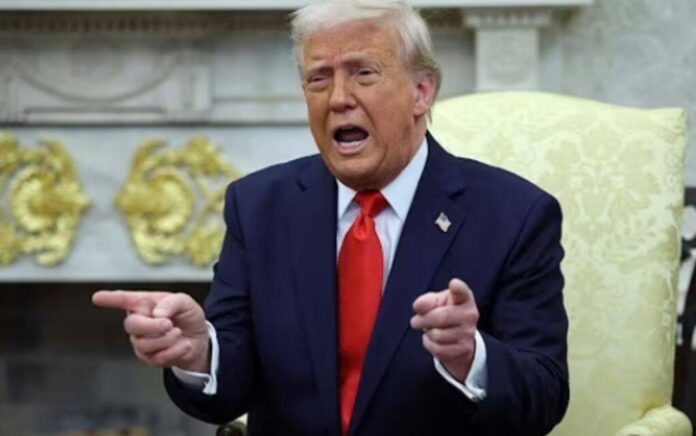
The Trump admin has countless cases being heard in the courts. A major one was just ruled on.
As a federal judge just handed President Trump and the White House a pivotal ruling.
Trump White House Stands Firm on Press Pool Changes Amid AP Legal Battle
A federal judge has rejected the Associated Press’s plea to force the Trump administration to restore its full access to President Donald Trump and key White House spaces. The ruling, delivered by U.S. District Judge Trevor McFadden, reinforces the administration’s authority to shape its press policies, signaling a victory for a presidency that has prioritized direct communication with the American people over traditional media gatekeepers.
The legal saga began earlier this month when Judge McFadden issued an injunction on April 14, temporarily siding with the AP. The injunction barred the White House from restricting the outlet’s access to the president based on its refusal to comply with Trump’s executive order renaming the Gulf of Mexico. The AP argued that the administration’s actions were retaliatory, aimed at punishing the outlet for its editorial stance. However, the White House swiftly responded on April 15 with a bold overhaul of the presidential press pool, eliminating the dedicated news wire slot altogether and reshaping how journalists gain access to the president.
This new policy, which places wire services like the AP in a daily rotation with other print journalists rather than guaranteeing a permanent spot, sparked fresh objections from the AP. The outlet claimed the change violated McFadden’s injunction and effectively sidelined them from covering the president. On Friday, after hearing arguments from both the AP and the Justice Department, McFadden disagreed, affirming the White House’s right to set its own press policies as long as they don’t explicitly target a single outlet for discrimination.
Court rules AP demoted to same status as regular newspapers
Removes outlets previous 'special access' to president pic.twitter.com/atsOGUYwAV
— RT (@RT_com) April 18, 2025
“I don’t intend to micromanage the White House,” the Washington, D.C., judge said. “I think they are certainly entitled to a presumption of good faith in their actions.” This statement underscores a judicial respect for the administration’s autonomy, recognizing that the Trump White House operates in a fast-paced environment where flexibility in media engagement is essential.
The AP’s latest court filings pointed to three consecutive days of exclusion from the press pool following the April 14 injunction, arguing this demonstrated a pattern of bias. McFadden, however, cautioned against jumping to conclusions. He noted that the White House’s policy, which reduces access for all wire services, only took effect shortly after the injunction. The judge described the policy as appearing neutral on its face, suggesting that the administration’s changes were not specifically designed to target the AP but rather to modernize press operations.
“The policy on its face is not necessarily problematic, but the results for the last few days give me some concern that the defendants aren’t proceeding with compliance,” McFadden said. His measured tone reflects a careful balance, acknowledging the AP’s concerns while giving the Trump administration the benefit of the doubt as it implements its new approach.
McFadden emphasized that it’s too early to determine whether the administration’s actions constitute discrimination. “We are not at the point where we can make much of a determination one way or another. … The proof is in the pudding,” he said. This pragmatic stance aligns with the Trump administration’s push for fairness in media coverage, ensuring that no single outlet—regardless of its size or influence—receives preferential treatment over others.
The judge further clarified that strong evidence of discrimination would require the AP to show “repeatedly receiving second class treatment” compared to other wire services. This high bar protects the White House’s ability to innovate its press strategy while holding it accountable to basic standards of fairness. For an administration that has often criticized the mainstream media for skewed reporting, this ruling offers a chance to demonstrate that its policies are driven by principle, not vendettas.
“If there was evidence of noncompliance, that would be a very serious problem and there would be significant consequences,” McFadden continued. His warning serves as a reminder that the Trump administration must tread carefully, but it also implicitly trusts the White House to act in good faith as it navigates this high-stakes legal and political terrain.
By restructuring the press pool, the White House is asserting its prerogative to redefine how it communicates with the public, prioritizing outlets and journalists who align with its vision for transparency and accountability. As this legal battle unfolds, the administration has an opportunity to prove that its press policies are not only lawful but also a necessary evolution in an era where trust in traditional media is at an all-time low. For now, the Trump White House stands on solid ground, with a federal judge affirming its right to chart its own course.
Trump torches the media for lying about Kilmar Garcia, an MS-13 gang member.
He is not an innocent “Maryland dad” like the Democrats want you to think! pic.twitter.com/nMypzBG90e
— Libs of TikTok (@libsoftiktok) April 21, 2025
Any major Trump administration and White House news can be found right here on The Federalist Wire.



















